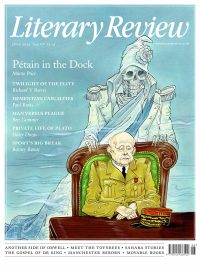Anthony Cummins
Class Act
Mrs S
By K Patrick
Fourth Estate 304pp £16.99
K Patrick, a non-binary writer and former greengrocer based in the Outer Hebrides, was recently named by Granta as one of Britain’s best young novelists on the strength of this impressive debut. Mrs S is a tense, often funny tale of lust and longing, which by its end has turned into a moving yet non-maudlin reflection on the complexity of gender. It follows a 22-year-old Australian who has arrived in England to take a job as matron at a girls’ boarding school. The story, set over a single summer term, centres on the narrator’s desire for the headmaster’s wife, the titular Mrs S, whose hints of reciprocation disturb the protagonist’s sense ‘of what is straight and not straight’.
Patrick’s idiosyncratic approach to naming provides the keynote of a novel in which identity is disorientingly fluid. Only Mrs S comes close to the privilege of being named. The pupils are always simply ‘the Girls’. The effect is austere but also amusing: ‘My annexe, attached to one of the sixth form boarding houses, is adjacent to the woman who runs the sanatorium, a nurse, The Nurse.’ Punctuation is unusual, too. Look at the passage below, in which Mrs S, replacing an absent art teacher, tells a class to copy Picasso’s Guernica. Three voices (not counting the narrator’s) speak:
Didn’t we need permission to do this? … Mrs S mixes more paint. Permission from who? From like Picasso? Another Girl pinches her waist. Picasso is dead you idiot. She panics. Isn’t he? Isn’t he dead? I believe so, very, in fact. Is it true you can only get rich from art once you’re dead? Who said that? The art teacher, she lets us call her by her first name. Does she. Yes. The Girls inch forward.
A mood of heat-hazed eroticism hangs over passages in which the narrator watches Mrs S as she is gardening or at the school sports day. ‘The fact that Mrs S does not quite wield her power only adds to it. We are all waiting to be noticed,’ the narrator says. The wait comes to an end, or seems to, when Mrs S invites the narrator to sneak off for an afternoon swim in a nearby river (an outing that culminates in the exquisite agony of the narrator being asked to check her body for ticks). Contrasted with this fraught longing is the narrator’s attachment to a lesbian colleague, the Housemistress, whose no-nonsense energy lets air into the cloistered ambience. Thanks to her, the narrator ends up hungover after a night out in a nearby town – the untimely prelude to an impromptu dinner invitation from none other than the headmaster and his wife. The resulting scene is one of several expertly prolonged set pieces, poised between slapstick and suspense.
Against the backdrop of the narrator’s mounting interior crisis, the everyday trials of the Girls unfold. A slow-burning fuse is lit when the narrator and the Housemistress stumble upon pupils drunk on vodka; the incident, hushed up, lies ready to overturn the lives of all three central characters as Patrick braids the story’s various strands into a high-stakes drama. When it finally arrives, the narrator’s long-dreamed-of sexual release – frankly evoked in scenes that are delicate but not demure – brings only further tension, and not simply because the lovers fear exposure. It is in its climactic scenes, which prompt us to question the difference between understanding and openness, that this distinctive first novel confirms its excellence.

Sign Up to our newsletter
Receive free articles, highlights from the archive, news, details of prizes, and much more.@Lit_Review
Follow Literary Review on Twitter
Twitter Feed
The son of a notorious con man, John le Carré turned deception into an art form. Does his archive unmask the author or merely prove how well he learned to disappear?
John Phipps explores.
John Phipps - Approach & Seduction
John Phipps: Approach & Seduction - John le Carré: Tradecraft; Tradecraft: Writers on John le Carré by Federico Varese (ed)
literaryreview.co.uk
Few writers have been so eagerly mythologised as Katherine Mansfield. The short, brilliant life, the doomed love affairs, the sickly genius have together blurred the woman behind the work.
Sophie Oliver looks to Mansfield's stories for answers.
Sophie Oliver - Restless Soul
Sophie Oliver: Restless Soul - Katherine Mansfield: A Hidden Life by Gerri Kimber
literaryreview.co.uk
Literary Review is seeking an editorial intern.